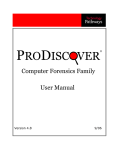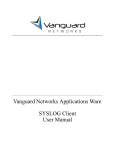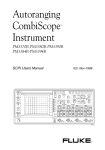Download Installation Guide - Advanced Debugging System (ADS)
Transcript
ADS INSTALLATION GUIDE PAGE 1 CICS/Transaction Server (z/OS) ADS is distributed via our website (www.DebugCICS.com). All modules are pre-assembled for a specific release of CICS and are combined into a single object file, complete with all the necessary link-edit statements. Source modules: DSPEXITP The following source code is available for customization: is an exception table that contains the "generic" names of modules to be excluded from monitoring. You should review these entries to avoid conflicts with other system-oriented products and non-standard (custom) interfaces. DSPNAMES is a table of pointers used to identify storage within the CICS region. You will increase the accuracy of the ADS feedback feature if you identify any additional control blocks you may have added to your system. DSPSECTY is a security table that restricts user access to specific programs and files. It is intended for use in production or other sensitive environments where ADS would only be used by authorized personnel. The table can contain a list of generic (wild-card) terminal names or authorized operator id's. DSPINITL is a macro that contains the default user profile and PF KEY definitions. By changing these parameters, ADS may not conform to the user manual. Source Level Option: This feature integrates your source code with the debugging process. For COBOL programs, it allows source statements to be dynamically inserted without the need for recompilation. This is accomplished with an additional jobstep that reads the compiler listing and stores the source reference information in a shared VSAM cluster. Password Sign-on: To activate ADS, run the ADSM transaction, which will prompt you for a password. If you don't have a password, or if your password has expired, ADS will display a four digit "parm code". To obtain a password contact us with the "parm code" via: Telephone: 732 247-2727 Toll Free (US): 800 603-3114 Fax: 732 846-3515 [email protected] ADS INSTALLATION GUIDE PAGE 2 CICS RESOURCE DEFINITIONS TRANSACTIONS: ( TASkDATAKey = CICS, TASKDAtaloc = BELOW ) TRansaction ==> ADSP PROGram ==> DFHDSP PRIORity ==> 0 / ADSM DSPENTRY 0 / SELE DSPDELET 255 PROGRAMS: ( Language = Asm, EXECKey = CICS, Datalocation = BELOW ) PROGram ==> DFHDSP DSPFILE DSPLABEL DSPENTRY DSPINITL DSPWHAT DSPDELET DSPNAMES DSP3270 /2 DSPEDIT DSPROUTE DSP3270 /5 DSPFMAIN DSPTRACE DSPICTRL RESident==> NO THREADSAFE==NO PROGram ==> DSPEXITP RESident==> YES (required for these 4 programs) FILES: File LSRPOOLID STRINGS RECORDFormat OPERATIONS ==> ==> ==> ==> ==> ADSFILE NONE 2 F ( all set ON ) ADS INSTALLATION GUIDE PAGE 3 CICS MULTI-REGION OPTION To operate ADS in an MRO environment, the same set of PPT entries must be defined in each accessible region. In addition, the PCT entries must be defined as follows: ADS requires the following three PCT entries: ADSP ADSM SELE ADS Processor Menu Generator Select Terminal (any four characters ending with "P") (any four characters ending with "M") (any four character transaction id) The PCT entries for ADSP and ADSM must be installed to allow the desired region to be accessed without the use of CRTE. For example: Terminal region (TOR) Application region (AOR-A) Application region (AOR-B) ADSP remote(AOR-A) BDSP remote(AOR-B) TDSP local ADSP local BDSP local ADSM remote(AOR-A) BDSM remote(AOR-B) TDSM local ADSM local BDSM local The "Select terminal" transaction must be fully cross-referenced to allow CICS to acquire and reroute the requested terminal for breakpoint processing. Terminal region (TOR) Application region (AOR-A) Application region (AOR-B) SELE remote(AOR-A) BELE remote(AOR-B) TELE local SELE local BELE remote(AOR-B) TELE remote(TOR) SELE remote(AOR-A) BELE local TELE remote(TOR) ADS INSTALLATION GUIDE PAGE 4 INSTALLING THE FILES Allocate a sequential file to receive the data. //TEMP EXEC PGM=IEFBR14 //UPLOAD DD UNIT=SYSDA,DISP=(NEW,CATLG), // DCB=(BLKSIZE=80 /0 /,LRECL=80 /,RECFM=FB), // SPACE=(TRK,(50,10)),DSN=xxxxx.UPLOAD Upload source tables: (example using IND$FILE) C:\>SEND IEBUPDTE.SRC 'xxxxx.UPLOAD' CRLF ASCII Install source tables: //TABLES EXEC //SYSPRINT DD //SYSUT2 DD //SYSIN DD PGM=IEBUPDTE,PARM=NEW SYSOUT=* DISP=OLD,DSN=user.source.library DSN=xxxxx.UPLOAD,DISP=SHR Upload the appropriate object file: (without conversion) C:\>SEND xxxxx.OBJ 'xxxxx.UPLOAD' Install ADS: //ADS EXEC //SYSPRINT DD //SYSLIB DD //SYSUT1 DD //SYSLMOD DD //SYSLIN DD PGM=IEWL,PARM='LIST' SYSOUT=* DISP=SHR,DSN=cics.loadlib UNIT=SYSDA,SPACE=(CYL,(4,1)) DISP=SHR,DSN=cics.user.loadlib DSN=xxxxx.UPLOAD,DISP=SHR (for DFHEAI) ADS INSTALLATION GUIDE PAGE 5 SOURCE LEVEL OPTION 1. Define the KSDS file with the IDCAMS utility. 2. Create a new CICS FCT entry for the dataset. 3. Insert //ADSFILE DD in the CICS jobstep JCL. 4. Build JCL procs for program compilation jobs. IDCAMS: DEFINE CLUSTER (NAME(vsam.adsfile) KEY(9 0 /) SHR(3,3) CISZ(8192) RECORDSIZE(8182 8182) RECORDS( number of programs * 10 / )) Initialize: //INIT EXEC //STEPLIB DD //SYSPRINT DD //SYSIN DD //SYSUT1 DD FCT: (or CSD) PGM=ADSLABEL,PARM=DIR DISP=SHR,DSN=ads.loadlib SYSOUT=* DUMMY DISP=SHR,DSN=vsam.adsfile Lsrpoolid(NONE) DFHFCT TYPE=DATASET,ACCMETH=VSAM,DATASET=ADSFILE, SERVREQ=(GET,BROWSE,UPDATE,NEWREC,DELETE), RECFORM=(FIXED,BLOCKED),STRNO=2,LSRPOOL=NONE C C Do not use VSAM shared buffer resources for this dataset. The ADSFILE is also used as the vehicle to maintain your installation's sign-on parameter. ADS INSTALLATION GUIDE PAGE 6 SOURCE LEVEL PROCEDURE Source Code Command Level or Macro Preprocessor Temporary Source ASSEMBLY or COMPILER SYSLIN SYSPRINT LNKEDIT Relocatable Program Library ADSLABEL Program Listing ADSFILE ADS INSTALLATION GUIDE PAGE 7 COBOL PROCEDURE //PRE EXEC pre-processor (Command or Macro Level) //* //COB EXEC PGM=cobol, // PARM= to generate DMAP, PMAP, and VERB //* VS COBOL-II & UP = LIST, MAP, NOOFFSET //SYSPRINT DD UNIT=SYSDA,DISP=(MOD,PASS,DELETE), // SPACE=(TRK,(25,5)),DSN=&&LISTING, // DCB=(RECFM=FB,LRECL=121,BLKSIZE=2662) COBOL/CAPEX // DCB=(RECFM=FB,LRECL=133,BLKSIZE=2660 /) VS COBOL-II //* //ERRS EXEC PGM=ADSLABEL,PARM='DUMMY,NOPMAP,NODMAP', // COND=(5,GT,COB) print cobol errors //SYSPRINT DD SYSOUT=* //SYSIN DD DSN=&&LISTING,DISP=(OLD,DELETE) //* //ADS EXEC PGM=ADSLABEL,PARM='options',COND=(5,LT,COB) //SYSPRINT DD SYSOUT=* //SYSIN DD DSN=&&LISTING,DISP=(OLD,DELETE) //SYSUT1 DD DISP=SHR,DSN=vsam.adsfile //* //LKED EXEC PGM=IEWL,COND=(5,LT,COB) PARM options: (for ADS jobstep) PGM=&id NOSOURCE - NODMAP NOPMAP NOOFFSET CLIST NOLIST DIR VER2 CAPEX RETPD=nnn DUMMY ENQ=qname NOVSAM - Program PPT name (default is COBOL PROGRAM-ID). Generates label reference information only. Saves disk space by not displaying the procedure division on-line. Suppress the listing of the COBOL Data division map. Suppress the listing of the COBOL Procedure map. Suppress procedure offset listing (same as NOPMAP). Print a condensed listing of the procedure verbs. Suppress program listing (print statistics page only). List the file directory (assumed when space is low). Indicates VS COBOL-II or COBOL LE/370 compiler. Indicates use of the CAPEX optimizing compiler. Mark for deletion after 'n' days (the default is 10). Print only. Don't open VSAM file (same as RETPD=0 /). Override the ENQ "qname" (default is ADSLABEL). Create intermediate sequential data on SYSUT2 instead of VSAM (for VM/CMS, to update VSAM file remotely). ADS INSTALLATION GUIDE PAGE 8 C (370, MVS, ++, SAS) PROCEDURE //PRE //* //C // EXEC CICS translator EXEC PGM=EDCCOMP, PARM= must include: LIST,NOOFFSET,SHOWINC,RENT,AGGR SAS/C requires: LINENO,SOURCE,OMD,RENT //SYSCPRT DD UNIT=SYSDA,DISP=(MOD,PASS,DELETE), // DCB=(RECFM=VBA,LRECL=137,BLKSIZE=882), // SPACE=(CYL,(8,3)),DSN=&&PRINT //SYSUT1 DD xxxx,DCB=(LRECL=80,BLKSIZE=320 /0 /,RECFM=FB) * //SYSUT2 DD xxxx,DCB=(LRECL=80,BLKSIZE=320 /0 /,RECFM=FB) //SYSUT3 DD xxxx,DCB=(LRECL=80,BLKSIZE=320 /0 /,RECFM=FB) //SYSUT4 DD xxxx,DCB=(LRECL=80,BLKSIZE=320 /0 /,RECFM=FB) //SYSUT5 DD xxxx,DCB=(LRECL=80,BLKSIZE=320 /0 /,RECFM=FB) //SYSUT6 DD xxxx,DCB=(LRECL=80,BLKSIZE=320 /0 /,RECFM=FB) //SYSUT7 DD xxxx,DCB=(LRECL=3200,BLKSIZE=640 /0 /,RECFM=FB) //SYSUT8 DD xxxx,DCB=(LRECL=3200,BLKSIZE=640 /0 /,RECFM=FB) //SYSUT9 DD xxxx,DCB=(LRECL=137,BLKSIZE=6850 /,RECFM=VB) //* //ERRS EXEC PGM=ADSLABEL,PARM='DUMMY,NOPMAP',COND=(5,GT,C) //SYSPRINT DD SYSOUT=* //SYSIN DD DSN=&&PRINT,DISP=(OLD,DELETE) //* //ADS EXEC PGM=ADSLABEL,PARM='options',COND=(5,LT,C) //SYSPRINT DD SYSOUT=* //SYSIN DD DSN=&&PRINT,DISP=(OLD,DELETE) //SYSUT1 DD DISP=SHR,DSN=vsam.adsfile //* //PRELINK EXEC PGM=IEWL,COND=(5,LT,C) PARM options: (for ADS jobstep) PGM=&Id NOPMAP NOLIST DIR RETPD=nnn DUMMY ENQ=qname NOVSAM * - Program name (default C.SYSIN member name). Suppress printout of the pseudo assembler listing. Suppress program listing (print statistics page only). List the file directory (assumed when space is low). Mark for deletion after 'n' days (the default is 10/). Print only. Bypass VSAM file (same as RETPD=0 /). Override the ENQ "qname" (default is ADSLABEL). Create intermediate sequential data on SYSUT2 instead of VSAM (for VM/CMS, to update VSAM file remotely). Default DCB parameters may produce blank pages in the “Pseudo Assembler Listing”. ADS INSTALLATION GUIDE PAGE 9 PL/1 PROCEDURE //PRE //* //PLI // EXEC pre-processor (Command or Macro Level) EXEC PGM=IEL0AA, PARM= must include the following options: 'OFFSET, STMT, AGGR, ATTRIBUTES(FULL), MAP, STORAGE' //SYSPRINT DD UNIT=SYSDA,DISP=(MOD,PASS,DELETE), // DCB=(LRECL=121,RECFM=FB,BLKSIZE=2662), // SPACE=(121,(250 /0 /0 /,50 /0 /)),DSN=&&LISTING //* //ERRS EXEC PGM=ADSLABEL,PARM='DUMMY',COND=(5,GT,PLI) //SYSPRINT DD SYSOUT=* //SYSIN DD DSN=&&LISTING,DISP=(OLD,DELETE) //* //ADS EXEC PGM=ADSLABEL,PARM='options',COND=(5,LT,PLI) //SYSPRINT DD SYSOUT=* //SYSIN DD DSN=&&LISTING,DISP=(OLD,DELETE) //SYSUT1 DD DISP=SHR,DSN=vsam.adsfile //* //LKED EXEC PGM=IEWL,COND=(5,LT,PLI) PARM options: (for ADS jobstep) PGM=&Id - Program Id. (required, there is no default name). NOSOURCE - Generates label reference information only. Saves disk space by not displaying source code on-line. NOLIST - Suppress program listing (print statistics page only). DIR - List the file directory (assumed when space is low). RETPD=nnn - Mark for deletion after 'n' days (the default is 10/). DUMMY Print only. Don't open VSAM file (same as RETPD=0 /). - ENQ=qname - Override the ENQ "qname" (default is ADSLABEL). NOVSAM Create intermediate sequential data on SYSUT2 instead of VSAM (for VM/CMS, to update VSAM file remotely). - ADS INSTALLATION GUIDE PAGE 10 ASSEMBLER PROCEDURE //PRE EXEC //* //ASM EXEC //SYSPRINT DD // // //* //ERRS EXEC //SYSPRINT DD //SYSIN DD //* //ADS EXEC //SYSPRINT DD //SYSIN DD //SYSUT1 DD //* //LKED EXEC pre-processor (Command or Macro Level) PGM=assembler (IFOX0 /0 /, "H", or High-Level) UNIT=SYSDA,DISP=(MOD,PASS,DELETE), DCB=(LRECL=121,RECFM=FB,BLKSIZE=2662), SPACE=(121,(250 /0 /0 /,50 /0 /)),DSN=&&LISTING PGM=ADSLABEL,PARM='DUMMY',COND=(5,GT,ASM) SYSOUT=* DSN=&&LISTING,DISP=(OLD,DELETE) PGM=ADSLABEL,PARM='options',COND=(5,LT,ASM) SYSOUT=* DSN=&&LISTING,DISP=(OLD,DELETE) DISP=SHR,DSN=vsam.adsfile PGM=IEWL,COND=(5,LT,ASM) PARM options: (for ADS jobstep) PGM=&Id - Program Id. (default is the name of the first CSECT). NOSOURCE - Generates label reference information only. Saves disk space by not displaying source code on-line. NOLIST - Suppress program listing (print statistics page only). DIR - List the file directory (assumed when space is low). RETPD=nnn - Mark for deletion after 'n' days (the default is 10/). DUMMY Print only. Don't open VSAM file (same as RETPD=0 /). - ENQ=qname - Override the ENQ "qname" (default is ADSLABEL). NOVSAM Create intermediate sequential data on SYSUT2 instead of VSAM (for VM/CMS, to update VSAM file remotely). - ADS INSTALLATION GUIDE PAGE 11 LINK-EDIT PROCEDURE Use this procedure only when more than one application program is combined to form a single, composite, load module. It gives you the ability to debug each individual program as if it were defined with its own PPT entry. It is not necessary to use this procedure when the program components are written in COBOL-II or LE and referenced via "static calls". //LKED EXEC or //LKED EXEC //* //SYSPRINT DD // //* //ADS EXEC //SYSPRINT DD //SYSIN DD //SYSUT1 DD PGM=IEWL,PARM='LIST,XREF,.....' PGM=IEWBLLNK,PARM='LIST,MAP' (MVS 4.1 +) UNIT=SYSDA,DISP=(NEW,PASS),SPACE=(TRK,(5,1)), DCB=(RECFM=FB,LRECL=121,BLKSIZE=2662),DSN=&&LIST PGM=ADSLABEL SYSOUT=* DSN=&&LIST,DISP=(OLD,DELETE) DISP=SHR,DSN=vsam.adsfile ALTERNATE (AMBLIST) PROCEDURE //AMBLST EXEC PGM=AMBLIST //SYSLIB DD DISP=SHR,DSN=user.loadlib //SYSPRINT DD UNIT=SYSDA,DISP=(NEW,PASS), // SPACE=(TRK,(25,3)),DSN=&&PRINT //SYSIN DD * LISTLOAD MEMBER=modname,OUTPUT=XREF /* //* //ADS EXEC PGM=ADSLABEL,PARM='options' //SYSPRINT DD SYSOUT=* //SYSIN DD DSN=&&PRINT,DISP=(OLD,DELETE) //SYSUT1 DD DISP=SHR,DSN=vsam.adsfile PARM options: NOLIST - Suppress AMBLIST output (print statistics page only). ADS INSTALLATION GUIDE PAGE 12 VSAM FILE MAINTENANCE These statistics appear on the last page of your listing: *************************************** * ADVANCED DEBUGGING SYSTEM RLS 10 * *************************************** I N I T I A L F I L E S T A T U S *************************************** NUMBER OF VSAM DATA RECORDS = nnn NUMBER OF EXTENTS ALLOCATED = nnn AVAILABLE FREE RECORD SPACE = nnn NUMBER OF CNTRL AREA SPLITS = nnn STATISTICS FOR PROGRAM xxxxxxxx: nnnn DATA DIV. NAMES. nnnn PARAGRAPH NAMES. nnnn PROCEDURE STMTS. nnn RECORDS REPLACED. nnn RECORDS INSERTED. When free space falls below 4,000 records, the oldest expired program is automatically deleted. You may have to reorganize the file, periodically, to reclaim space that may be wasted by VSAM control areas. To delete all programs whose retention period has expired: //PURGE EXEC //SYSPRINT DD //SYSUT1 DD //SYSIN DD ** PGM=ADSLABEL,PARM=’PURGE,RETPD=0 /’ ** SYSOUT=* DISP=SHR,DSN=vsam.adsfile DUMMY Use RETPD= to specify number of days to force an earlier retention period. To manually force deletion of specific programs, regardless of their expiration dates: //PURGE EXEC //SYSPRINT DD //SYSUT1 DD //SYSIN DD PURGE progname1 progname2 " " /* PGM=ADSLABEL SYSOUT=* DISP=SHR,DSN=vsam.adsfile * ADS INSTALLATION GUIDE PAGE 13 Considerations for DFHSRP During ADS startup, the program DSPINITL applies a dynamic patch to DFHSRP. This following ADS message may be issued at 'sign-on': UNABLE TO INITIALIZE PGM=DFHSRP This indicates that DFHSRP is protected (in LPA) and cannot be initialized by ADS. The solution is to remove DFHSRP from the LPA (by specifying 'PRVMOD=DFHSRP' in the CICS JCL parm and SHR=NO in the NLT). You may have to relink-edit DFHSRP with the NORENT option if necessary. ADS INSTALLATION GUIDE PAGE 14 VERIFY GLOBAL MONITORING Use the following on-line procedure to verify that ADS will monitor programs "by terminal": Activate terminal monitoring: ADSP READY TRACE The response should indicate: *TRACE TERMINAL IS IDLE Hit the ENTER key again: *TRACE0 / TERMINAL IS IDLE Remove terminal monitoring: ADSP DELETE TRACE The number zero is appended to the *TRACE indicator by the ADS global exit (DSPEXITP). It indicates that ADS is active at this terminal and shows how many programs were monitored. If a numeric digit is not displayed, after hitting ENTER the second time, it means that the ADS global exit is not enabled. Look for, and correct, the possible causes: a. A PPT entry is missing for either DSPEXITP or DSPROUTE Action: Add the PPT entry (or CSD) and use CECI to enable the global exit: CECI ENABLE PRO(DSPEXITP) EXIT(XPCFTCH) START b. The SIT is not generated to allow GLOBAL exits. Action: Specify "EXITS=YES" either in the SIT or the CICS parm. c. The ADSM/ADSP transactions may not be authorized to enable the exit. Action: Remove the security restriction from the PCT. The global exit program (DSPEXITP) is distributed as a source macro. It lets you identify the generic ("wildcard") names of programs that should not be monitored automatically via the "READY TRACE" command. It does not prevent you from using ADS, on such programs, to set breakpoints or to monitor them with any of the specific "ASSIGN MONITOR" functions. It is important, therefore, to define all of your "system-type" packages and non-standard applications.
















